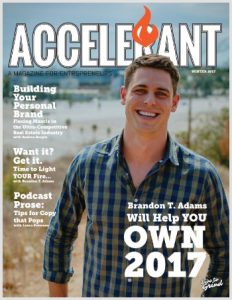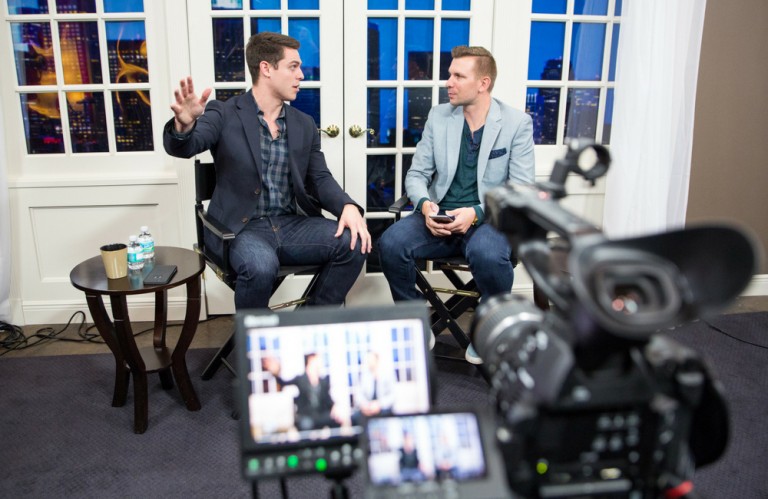Eight months ago I had no idea what it took to make a reality TV show. Sure, I’ve always loved television and being a ham in front of the camera. I even dreamed of making my own show. But I didn’t know how any of it really worked. I definitely didn’t think it would happen so soon that I could call myself an Executive Producer!
As of a few weeks ago, Emmy award-winning producer Greg Rollett and I have wrapped up Season 1 of Ambitious Adventures, our brand-new show featuring fun interviews of some seriously amazing entrepreneurs.
We traveled to five different cities around the U.S. and we’re already out getting sponsors for Season 2, a full 13-episode season.
It’s going to go nationwide, and I believe it can win an Emmy too.
Right now, you’re probably thinking, “Cool! But Brandon, how do you create your own TV show? Where do you even begin?”
Crowdfund Your Pilot
Okay, let’s start at the very beginning.
Usually, if you want to start a TV show, step one is to film a pilot. The first episode.
Then you have to take that pilot and pitch it to different networks.
In these pitch meetings, you try and get a big network to ‘pick it up.’ If you’re lucky, the network will give you a budget to film and produce a 13-episode season.
But it’s not cheap to film an episode, and you start losing control.
So instead, Greg and I partnered up to do it ourselves! He has an awesome studio, and, like me, experience being on TV. I also bring crowdfunding knowledge to the table. Combined, we make a great team!
After talking about possibilities, Greg said “Hey, let’s just crowdfund this thing. We’ll film it ourselves. We’ll find the talent ourselves.”
It wasn’t a long shot…
We both had really interesting friends who were launching six, seven, eight-figure businesses. So, on May 11th, 2016, we put our noses to the grindstone, launched the campaign just two months later, and raised $52,000!
It gave us the initial funds that we needed. It also gave us more opportunities, more publicity, and more outlets for our show.
It was a huge success!
And then as soon as we had that money, we thought, “Okay, we’ve gotta go film this!”
Leverage Your Network
You can’t get anywhere in life on your own. We leveraged our networks for every part of this process—from getting pledges for our Kickstarter campaign, to casting our talent and everything in between.
We didn’t launch the campaign until July 11th, and I spent those two months reaching out to my network. I didn’t just throw up the Kickstarter campaign and expect people to pledge.
I actually called up everyone I knew and said, “Hey, I’m doing a TV show. I’m partnered with Greg Rollett, and we’re looking for people to sponsor and fund the show.”
Of course, once people heard we were making a TV show, everyone wanted to be on it, but we couldn’t just cast everyone.
We needed special folks who would really make an impact.
A handful of the people we interviewed for our Humble Beginnings episode in Des Moines were also part of our network. Often, they were former podcast guests, like Phillip and Angelo from Tres Mentes Salsa, or Derian from Men’s Style Lab.
One of the big advantages of leveraging your network is that when you’re trying to make a TV show and you don’t have a track record yet, you have to sell yourself based on your personal reputation. Greg and I had to find people who believed in us already.
It was a grind! But hey, I live to grind!
People would ask “Oh, what’s your viewership?” We didn’t have any deals with big networks or anything. So instead, we just said, “We’re gonna be promoting through our platform and on social media.”
We took a ,“Build it and they will come,” stance and our supporters—thankfully—followed suit.
Make It Entertaining
Another benefit of our network was that we had a great Hollywood scriptwriter in it!
She’d written scripts for other shows before and did a fantastic job.
Here’s what we gave her:
- The different businesses we were going to interview
- The most important stipulation for us:
It had to be a combination of motivation, inspiration, education, and entertainment.
Greg and I knew we wanted the show to be a learning opportunity, and it is. We teach you things that you can take away like how to run a business or how to start a food company.
And it’s super inspirational, seeing these people who started from nothing grow to amazing heights.
But we also wanted to have fun, because it makes it more fun for the viewer too.
For example, I ate a hot pepper in one episode, and you could see my eyes tearing up on camera! In another one, I milked a cow—poorly.
Pure cinematic gold!
And our scriptwriter helped us craft that perfect story for each episode so that it’s always educational and informative, but never ever boring.
Then, of course, we had to go film it.
I’m not gonna lie–Greg and I killed it. We’re naturals.
The funny thing is, some of the best things happened off-script. After all, filming what we do is interesting; we’re just entrepreneurs talking business, but we also went out interviewing people and had a genuinely good time.
The authenticity added to some thoughtful pre-planning makes for the perfect combination.
Reap the Rewards
The past eight months have been a complete grind—for all my other businesses—but also for this TV show. It’s a lot of work. But it’s also a lot of fun, and it’s rewarding. Financially.
People always ask, “How do you make money with a TV show?”
This is how:
OPTION A:
Have a network pick it up and they pay you $200,000-$400,000 per episode to have the content you create for them, and they air it on TV.
OPTION B:
Release it on online outlets (Amazon, RokuTV, Netflix). If you’re going this route, you make the show yourself—luckily, we have an expert team to do it—, upload it and pay a monthly fee to the distributor.
So now you may be thinking that it looks like Option A makes you money and Option B loses you money.
Not true!
How do you make money from Option B?
- Sponsorships
For one, you can sell sponsorships. Say, Under Armour could pay us $50,000 per season, and in return, we’d wear their clothes and they’d be in our commercials.
- Pay to Participate
Individual people can also sponsor by paying to be featured in the episode. This is done all the time. People pay to get a segment in that show. It’s amazing marketing for them because it helps build up their celebrity status.
- More Sales of Your Products & Services
But honestly, where a real entrepreneur can make money is by building up their own credibility and influence, and then monetizing it on the back end.
When people watch our shows, they build trust with Greg and me.
They build confidence in us, they love us, and they want to work with us. Then they go to our website and buy my Influencer Accelerator, hire me as a consultant, or hire my team to do a crowdfunding campaign to go and raise six figures for their own project.
There’s a ton of ways to make money on the back end. The TV show is really your marketing outlet.
It’s an incredible tool.
When I first started my podcast, I did it because I didn’t want to pay for marketing. I wanted to build my own audience and create my own marketing. So I did!
The TV show accomplishes the same thing, just on a whole new level.
Conclusion
When you build up your celebrity status and make a TV show that people love, they’ll consume your content and want more and more and more.
They reach out to work with you. That is how you get more visibility, credibility, and income!
I’ve had huge success with this show so far—and it’s not even on air yet!
If you want to hear more, listen to Episode 189 of my podcast called “How To Start A TV Show And Make Money From It” where I talk about Greg’s incredible studio in Orlando and some of the adventures we’ve had along the way thus far.
And in the meantime, check out the baller promo for Ambitious Adventures, launching February 2nd!
Hope to see you on our next adventure!
 PS: Are you an entrepreneur with a great story?
PS: Are you an entrepreneur with a great story?
Tell me about it!
I’m looking to feature fellow ‘live to grind’ entrepreneurs in my Accelerant Magazine.
This is a Contributor Post. Opinions expressed here are opinions of the Contributor. Influencive does not endorse or review brands mentioned; does not and cannot investigate relationships with brands, products, and people mentioned and is up to the Contributor to disclose. Contributors, amongst other accounts and articles may be professional fee-based.

